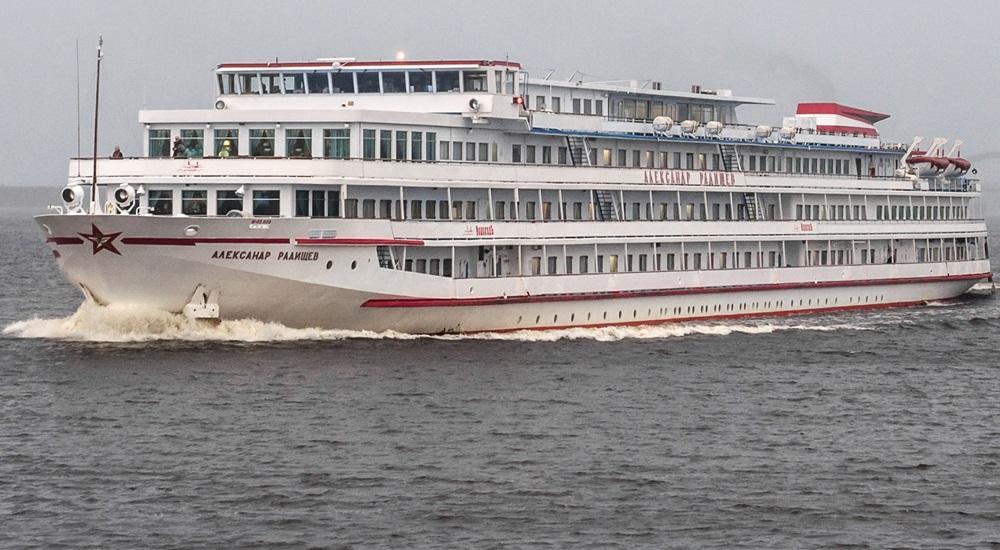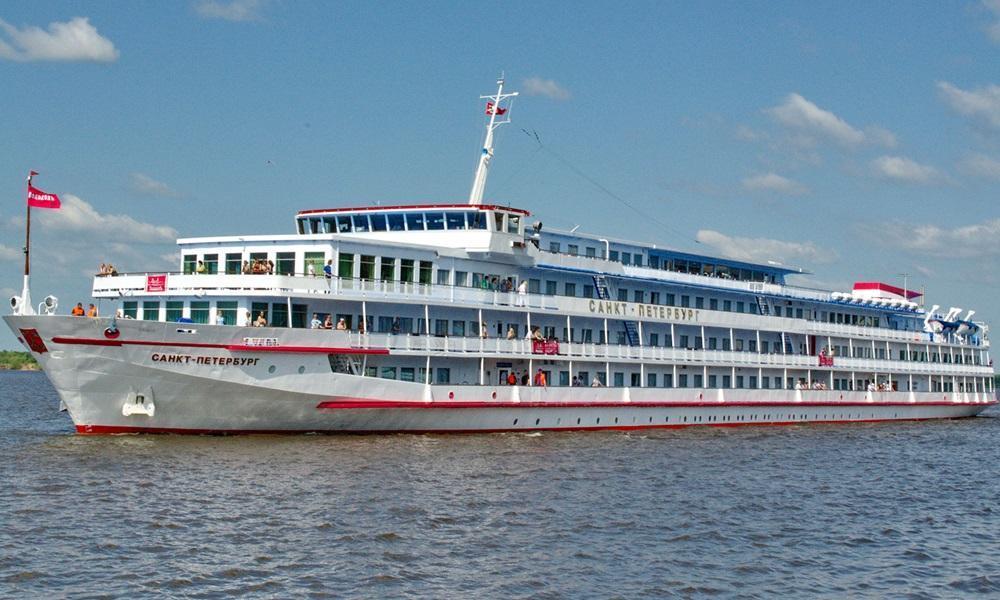MS Alexander Radishchev
MS Alexander Radishchev last position
The last location of MS Alexander Radishchev is in Russia Inland cruising en route to ELABUGA. The AIS position was last reported 2 months ago.
Current PositionSpecifications of MS Alexander Radishchev
| Year of build | 1982 / Age: 44 |
| Flag state | Russia |
| Builder | RSW Rosslauer Schiffswerft GmbH (Dessau-Rosslau, Germany) |
| Class | USSR Russian cruise ship (Project 301) |
| Ferry route / homeports | Moscow |
| Speed | 14 kn / 26 km/h / 16 mph |
| Length (LOA) | 125 m / 410 ft |
| Beam (width) | 17 m / 56 ft |
| Gross Tonnage | 5400 gt |
| Passengers | 272 |
| Crew | 110 |
| Decks | 5 |
| Cabins | 132 |
| Decks with cabins | 4 |
| Last Refurbishment | 2012 |
| Sister-ships | Vladimir Ilyich-class |
| Owner | Volga Shipping Company (Russia) |
| Operator | Vodohod |
MS Alexander Radishchev Review
Review of MS Alexander Radishchev
MS Alexander Radishchev cruise ship ("теплоход Константин Коротков" круизный корабль) is a traditional Russian river passenger vessel built for the USSR (Soviet Union) in the GDR (East Germany). The ship is currently owned and operated by the Russian company VODOHOD ("Водоход"). MS Radishchev cruises on the Volga and Svir rivers, departing from Moscow. All itineraries are roundtrips, visiting St Petersburg (13–14 days), Karelia (14 days), Sortavala (11 days), Kineshma–Plyos (7 days), Tver–Uglich–Myshkin (4 days), Uglich (3 days), and Cheboksary (3 days). Other ports of call include Goritsy, Petrozavodsk, Povenets, Mandrogi, Kizhi Island, Konevets, the Valaam Islands, Lodeynoye Pole, and Svirstroy.
The shipowner Vodohod is Russia’s largest river cruise operator. The company was founded in 2004 as Volga Shipping Company. Following its merger with Volga Flot Tour, Vodohod now operates over 50 cruise ships on the Don, Volga, Kama, and Moscow rivers, as well as the Volga–Don Canal, Volga–Baltic Waterway, and Lakes Ladoga and Onega.
VODOHOD’s predecessor, Volga Shipping Company (Volzhskoye Parokhodstvo / Волжское пароходство), was established in 1843 as a Volga steamship transportation company. In 2011, the company operated over 300 passenger and cargo vessels, transporting more than 6.7 billion tons of cargo and over 368,000 passengers across Russia’s largest inland waterways.

MS Radishchev was named after the Russian author and social critic Alexander Nikolayevich Radishchev (1749–1802), who was exiled to Siberia for seven years for criticizing Imperial Russia’s socio-economic order. The vessel was extensively refurbished in 2012.
Cabins
Accommodation includes 10 suites (6 Junior), 94 twins, 18 singles, and 10 triples. All cabins are outside (no interior rooms) and feature large opening windows, except for Lower Deck cabins with round non-opening portholes. Each cabin includes central air conditioning (individually controlled heating and ventilation), private en-suite bathroom (WC, shower, washbasin, hairdryer), flat TV, radio, refrigerator, wardrobe, safe (in the closet), vanity mirror, writing desk with chair, bedside table, reading lights, and 220 V power sockets. Suites additionally include a double bed, sofa, coffee table, armchairs, cabinet, and floor lamps. Ceiling height is 2.2 m.
After major refurbishments, all cabins were enlarged and fitted with new furniture, flooring, premium bedding, and modern lighting.
- Suites (located on the Middle Deck forward) are two-room cabins with a separate living room and bedroom, featuring four large opening windows, a double sofabed, armchairs, coffee table, king-size bed, mirrored vanity table with chair, and wardrobe. They accommodate up to four passengers.
- Junior Suites (Middle Deck aft) are single-room cabins with upper bunk beds, accommodating up to four passengers.
- Single Cabins (Middle and Boat Decks) are one-bed staterooms with one large opening window.
- Twin/Double Cabins (Middle and Boat Decks) are two-bed staterooms with one large opening window.
- Triple Cabins (Lower Deck) have three beds and two non-opening portholes and can also be booked as doubles.
Shipboard dining and entertainment options
Dining aboard MS Radishchev features European cuisine with traditional Russian specialties. Breakfast is buffet-style, lunch includes one meal (usually soup), and dinner is waiter-served with a traditional Russian menu. Waitstaff wear traditional Russian attire.
Entertainment onboard includes scheduled activities and live performances of classical and Russian folk music. Lectures cover Russian history and culture, while port talks by professional guides provide details about destinations, nearby towns, shore excursions, and tour options. Guests can also enjoy traditional Russian tea ceremonies, language lessons, dancing and singing classes, vodka tastings, and matryoshka (nesting doll) painting workshops.
MS Radishchev’s facilities include:
- (Boat Deck, Middle Deck) Two restaurants
- (Boat Deck) Panorama Bar Lounge
- (Sun Deck) Conference Hall and Bar (also used as Dance Hall, Cinema, or Meeting Room)
- (Middle Deck) Bar Lounge, Library, and Reading Hall
- (Sun Deck) Spa (Sauna), Solarium (outdoor seating with deckchairs and 4-seat tables), covered fitness area (outdoor gym with exercise machines)
- (Main Deck) Medical Room (Infirmary), Beauty Salon (hairdresser, barber, massage services), Kids Room, and Lobby (Reception Desk)
- (Middle Deck) Ironing Room (laundry service) and Boutique (Souvenir Shop)
- (Lower Deck) Fitness Room (Gym)
VODOHOD cruise deals
- Departure ports, check-in, boarding, and landing times are listed on the company’s website (vodohod.com) and on passenger boarding passes. Exact departure times are updated online the day before sailing.
- Children’s discount fares apply to passengers up to 14 years old (inclusive), based on their age at departure.
- Children aged 2–5 (inclusive) travel free without an additional bed (if no spare bed is available). Shore excursions are also complimentary.
- Infants under 2 years old travel free but are not provided with a bed, food, or tour services. Extra beds (cribs, cots) are unavailable.
- Single occupancy in a twin cabin is charged a 75% supplement.
- Cabin numbers are assigned 7 days before departure. A specific cabin reservation costs EUR 50 per person per cruise.
- Ticket prices include three meals daily: buffet breakfast (with tea, coffee, milk, cocoa, juice, and assorted hot and cold dishes), buffet lunch (with tea/coffee and water), and waiter-served dinner (with starter, main course—choice of meat, fish, or vegetarian—and dessert or fruit).
- On embarkation and disembarkation days, meal times depend on landing schedules. If a shore tour coincides with lunch, passengers receive complimentary meals at local restaurants or packed lunches.
- Included onboard events: Welcome Aboard Ceremony (“bread and salt”), Welcome Cocktail (one complimentary glass of champagne or juice), Tea Ceremony (tea and traditional pies), Vodka Show (blini and vodka tasting), Cocktail Party (one complimentary cocktail per person), Captain’s Dinner (gourmet menu, once per cruise), mulled wine or iced tea (depending on weather), complimentary Coffee Station (open at set times daily), and one bottled water (0.33 L per person per day). Also included are multilingual guide services, onboard entertainment (language and singing lessons, live music, nightly dancing, Wheelhouse tour).
- Complimentary excursions are listed in the ship’s itinerary program. Optional tours are available for booking onboard. Additional excursion fees apply to foreign passengers (excluding tourists from the Russian Commonwealth, Ukraine, Estonia, Latvia, and Lithuania). The surcharge varies by cruise length.
- Ticket prices exclude land transfers, beverages, snacks, phone calls, sauna use, optional excursions, travel insurance, gratuities, and personal expenses. Prices include 18% VAT.
- All onboard payments are made using the ship’s “Vodohod” debit card (issued at registration). The card can be used in all onboard venues and carries no fees or commissions. Cash is not accepted for onboard purchases. International bank cards are accepted for final settlement.
- Vodohod Gift Certificates (vouchers) can be purchased for any amount. The recipient may choose the itinerary, departure date, and cabin category. If the cruise cost is lower than the voucher amount, the difference is non-refundable.
- Smoking is permitted only in designated outdoor areas (aft sections of the Middle and/or Boat Decks). Smoking is prohibited in all interior spaces and open decks outside marked zones.
- All Vodohod ships offer morning exercise sessions and health gymnastics (led by a certified physician), oxygen cocktails, and dietary meals.
- Free onboard medical services include emergency care, basic first aid, blood pressure and temperature checks, and treatment of minor wounds.
- Passengers are advised to arrive at the departure city at least six hours before sailing. Boarding begins two hours before departure, and all passengers must be onboard at least one hour before sailing. Late arrivals are non-refundable.
- Vodohod’s main departure ports include Moscow, St Petersburg, Astrakhan, Nizhny Novgorod, Perm, Samara, Kazan, Volgograd, Rostov-on-Don, and Saratov.
Note: You can view CruiseMapper’s full list of river cruise ships and riverboats in the “Itinerary” section of our River Cruises hub, where all companies and their fleets are listed.
Other Vodohod cruise ships
MS Alexander Radishchev Wiki
Built as Sovetskaya Ukraina, MS Radishchev is one of Russia's signature "Project 301" river cruise ships.
Vladimir Ilyich-class Russian river ships
The "Vladimir Ilyich class" (also known as "Project 301") consists of three series of Russian river cruise ships built in the German Democratic Republic (GDR) for the Soviet Union between 1974 and 1983. The class name honors Vladimir Ilyich Ulyanov (1870–1924), recognized as the founder of the USSR.
A total of 22 vessels were produced by VEB Elbewerft Boizenburg, making this one of the most successful riverboat designs of its time. These ships operated passenger cruises throughout Northwestern USSR, navigating rivers such as the Volga, Belomorkanal, Lake Onega, Volga–Don Canal, Kama, and Amur, as well as the Dnieper River (Ukraine) and the Black Sea. After the USSR's dissolution in 1991, all vessels were acquired by private companies (Russian and foreign).

"Project 301" ship technology
All "Project 301" vessels share the following characteristics:
- LOA length: 125 m (410 ft)
- Beam (width): 17 m (55 ft)
- DWT tonnage: 3063 tons
- V-shaped hulls (design variations by series, including differences in external details, window shapes—rectangular or rounded—and wheelhouse headlights)
- 5 decks
- Passenger capacity: 240 passengers and 110 crew members, with 102 all-outside cabins, 2 restaurants, 2 bar lounges, sauna room, souvenir shop, lobby (reception desk with safe), and a 360-degree promenade deck with outdoor seating
- Propulsion: three marine diesel engines “Viertakt-Dieselmotor” (4-stroke, model 6ЧРН 36/45 / aka ЭГ70-5), each equipped with a turbocharger
- The third (final) series featured more powerful propulsion systems and bow thrusters
- Staterooms included single and double cabins (originally 1-, 2-, and 3-bed layouts), all with en-suite bathrooms
- During later reconstructions, larger cabins (including suites) were added
Depending on the series, ships differed in size and equipment (notably in diesel engine models). Many were fully refurbished and rebuilt for foreign river cruise operators such as Viking, AMAwaterways, and Grand Circle. During these multi-million-dollar drydock refits, passenger capacities were reduced to enhance comfort and safety.
Project 301 ships
The first series of Project 301 includes:
- Vladimir Ilyich (1975, now Sankt Peterburg / Санкт-Петербург)
- Mariya Ulyanova (1975, now Viking Rurik)
- Yevgeniy Vuchetich (1976, now Dnieper Princess)
- Sovetskaya Ukraina (1976, now Konstantin Korotkov)
- Tikhiy Don (1977, Тихий Дон)
- XXV Syezd KPSS (1977, now Petr Chaykovskiy)
The second series includes:
- Sovetskaya Rossiya (1977, now Nizhny Novgorod / Нижний Новгород)
- 60 let Oktyabrya (1978, scrapped as Avicenna)
- Rossiya (1978, Россия)
- Vladimir Mayakovskiy (1978, Владимир Маяковский)
- Lenin (1979, now Mikhail Bulgakov / Михаил Булгаков)
- Aleksandr Ulyanov (1979, now Kronstadt / Кронштадт)
- Mikhail Lomonosov (1979, now Viking Sineus)
- Konstantin Fedin (1980, Константин Федин)
- 30 let GDR (1980, scrapped as Ferris Flotel)
- Vissarion Belinskiy (1980, Виссарион Белинский)
The third (final) series includes:
- Sovetskaya Konstitutsiya (1981, now Nikolay Karamzin / Николай Карамзин)
- Nikolay Chernyshevsky (1981, Николай Чернышевский)
- Nikolay Dobrolyubov (1981, now Andrey Rublev / Андрей Рублев)
- Aleksandr Radishchev (1982, Александр Радищев)
- Aleksandr Griboyedov (1982, now Knyazhna Viktoria / Княжна Виктория)
- Fedor Dostoevskiy (1983, Федор Достоевский)
